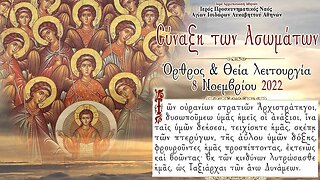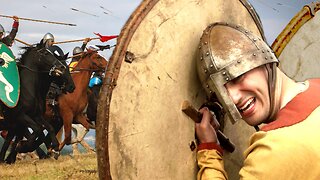Premium Only Content

May 27, 2022, John the Russian of Evia | Greek Orthodox Divine Liturgy
The Holy Confessor John the Russian was born in Little Russia around 1690, and was raised in piety and love for the Church of God. Upon attaining the age of maturity he was called to military service, and he served as a simple soldier in the army of Peter I and took part in the Russo-Turkish War. During the Prutsk Campaign of 1711 he and other soldiers were captured by the Tatars, who handed him over to the commander of the Turkish cavalry. He took his Russian captive home with him to Asia Minor, to the village of Prokopion.
The Turks tried to convert the Christian soldiers to the Moslem faith with threats and flattery, but those who resisted were beaten and tortured. Some, alas, denied Christ and became Moslems, hoping to improve their lot. Saint John was not swayed by the promise of earthly delights, and he bravely endured the humiliation and beatings.
His master tortured him often in the hope that his slave would accept Islam. Saint John resolutely resisted the will of his master saying, “You cannot turn me from my holy Faith by threats, nor with promises of riches and pleasures. I will obey your orders willingly, if you will leave me free to follow my religion. I would rather surrender my head to you than to change my faith. I was born a Christian, and I shall die a Christian.”
Saint John’s bold words and firm faith, as well as his humility and meekness, finally softened the fierce heart of his master. He left John in peace, and no longer tried to make him renounce Christianity. The saint lived in the stable and took care of his master’s animals, rejoicing because his bed was a manger such as the one in which the Savior was born.
From morning until late evening the saint served his Turkish master, fulfilling all his commands. He performed his duties in the winter cold and summer heat, half naked and barefoot. Other slaves frequently mocked him, seeing his zeal. Saint John never became angry with them, but on the contrary, he helped them when he could, and comforted them in their misfortune.
One day, the officer left Prokopion and went to Mecca on pilgrimage. A few days later, his wife gave a banquet and invited her husband’s friends and relatives, asking them to pray for her husband’s safe return. Saint John served at the table, and he put down a dish of pilaf, his master’s favorite food. The hostess said, “How much pleasure your master would have if he could be here to eat this pilaf with us.” Saint John asked for a dish of pilaf, saying that he would send it to his master in Mecca. The guests laughed when they heard his words. The mistress, however, ordered the cook to give him a dish of pilaf, thinking he would eat it himself, or give it to some poor family.
Taking the dish, Saint John went into the stable and prayed that God would send it to his master. He had no doubt that God would send the pilaf to his master in a supernatual manner. The plate disappeared before his eyes, and he went into the house to tell his mistress that he had sent the pilaf to his master.
After some time, the master returned home with the copper plate which had held the pilaf. He told his household that on a certain day (the very day of the banquet), he returned from the mosque to the home where he was staying. Although the room was locked, he found a plate of steaming pilaf on the table. Unable to explain who had brought the food, or how anyone could enter the locked room, the officer examined the plate. To his amazement, he saw his own name engraved on the copper plate. In spite of his confusion, he ate the meal with great relish.
When the officer’s family heard this story, they marveled. His wife told him of how John had asked for a plate of pilaf to send to his master in Mecca, and how they all laughed when John came back and said that it had been sent. Now they saw that what the saint had said was true (Compare the story of Habakkuk, who miraculously brought a dish of pottage to Daniel in the lions’ den [Dan. 14:33-39], in the Septuagint).
Toward the end of his difficult life Saint John fell ill, and sensed the nearness of his end. He summoned the priest so that he could receive Holy Communion. The priest, fearing to go to the residence of the Turkish commander openly with the Holy Gifts, enclosed the life-giving Mysteries in an apple and brought them to Saint John.
Saint John glorified the Lord, received the Body and Blood of Christ, and then reposed. The holy Confessor John the Russian went to the Lord Whom he loved on May 27, 1730. When they reported to the master that his servant John had died, he summoned the priests and gave them the body of Saint John for Christian burial. Almost all the Christian inhabitants of Prokopion came to the funeral, and they accompanied the body of the saint to the Christian cemetery.
-
 2:50:43
2:50:43
Greek Orthodox Church St. Isidoroi, Athens, Greece
2 years agoNovember 8, 2022, Synaxis of the Bodiless Powers | Greek Orthodox Divine Liturgy
116 -
 LIVE
LIVE
Vigilant News Network
8 hours agoBombshell Study Reveals Where the COVID Vaccine Deaths Are Hiding | Media Blackout
2,246 watching -
 1:17:59
1:17:59
Sarah Westall
3 hours agoDOGE: Crime & Hysteria bringing the Critics & the Fearful - Plus new CDC/Ukraine Crime w/ Dr Fleming
10.1K2 -
 45:39
45:39
Survive History
9 hours ago $0.33 earnedCould You Survive in the Shield Wall at the Battle of Hastings?
6.49K5 -
 1:50:28
1:50:28
TheDozenPodcast
8 hours agoViolence, Abuse, Jail, Reform: Michael Maisey
13.4K1 -
 23:01
23:01
Mrgunsngear
1 day ago $2.94 earnedWolfpack Armory AW15 MK5 AR-15 Review 🇺🇸
29.3K12 -
 25:59
25:59
TampaAerialMedia
1 day ago $0.72 earnedUpdate ANNA MARIA ISLAND 2025
13.1K1 -
 59:31
59:31
Squaring The Circle, A Randall Carlson Podcast
10 hours ago#039: How Politics & War, Art & Science Shape Our World; A Cultural Commentary From Randall Carlson
10.4K2 -
 13:21
13:21
Misha Petrov
10 hours agoThe CRINGIEST Thing I Have Ever Seen…
9.2K33 -
 11:45
11:45
BIG NEM
6 hours agoWe Blind Taste Tested the Best Jollof in Toronto 🇳🇬🇬🇭
5.02K